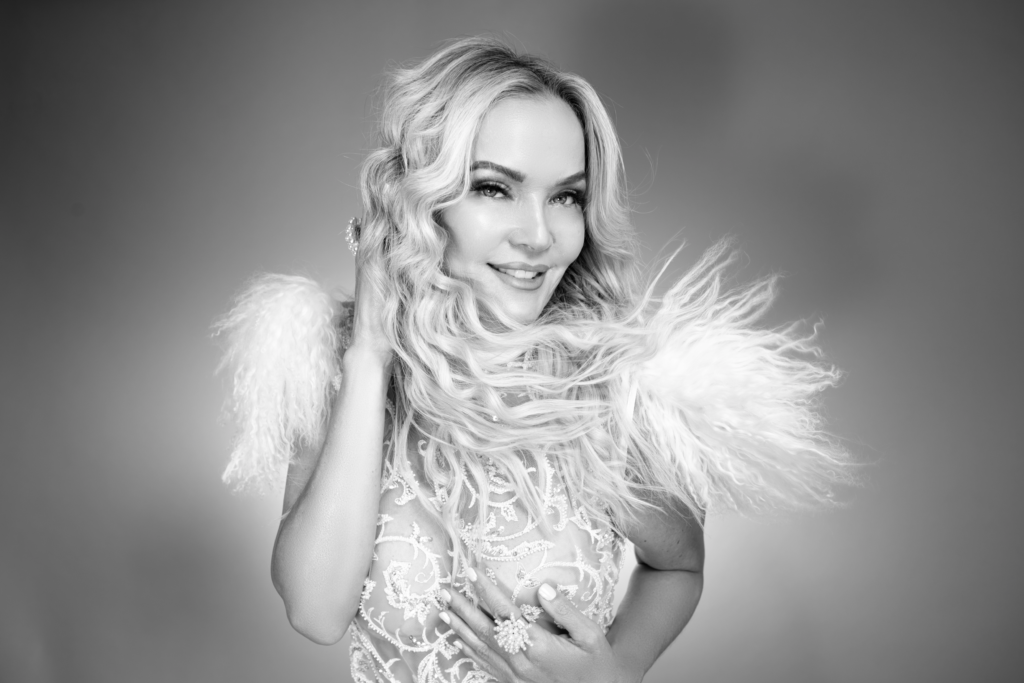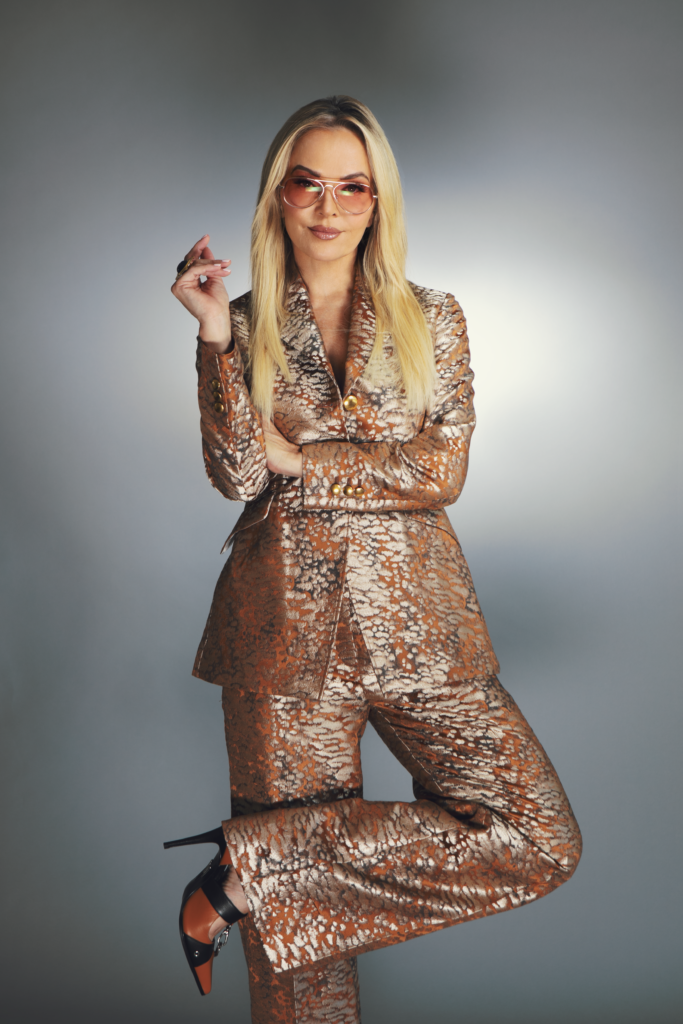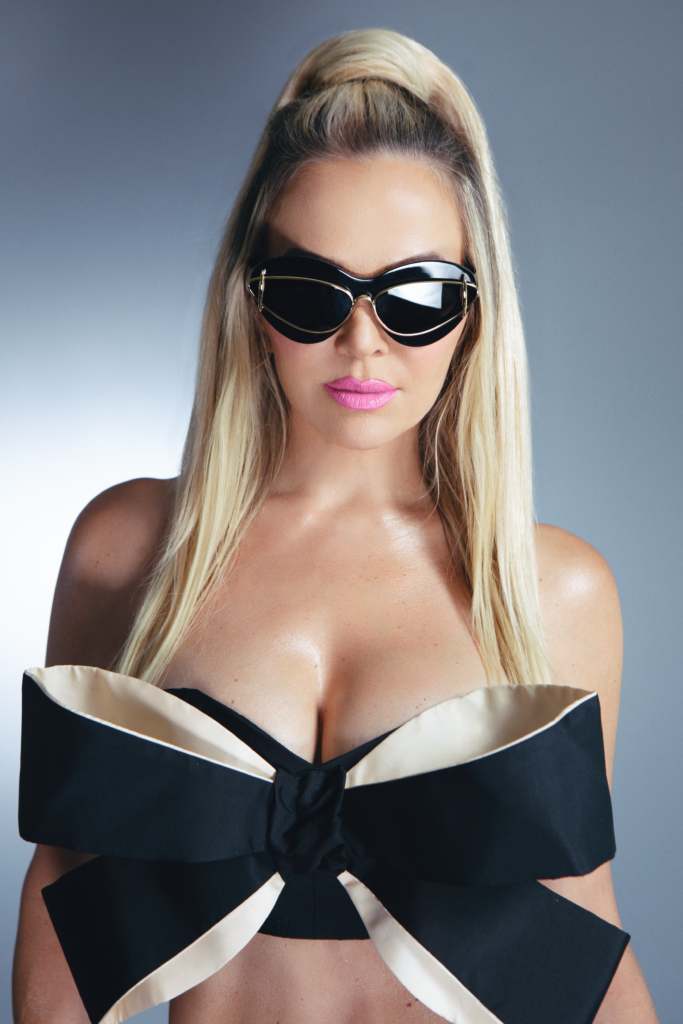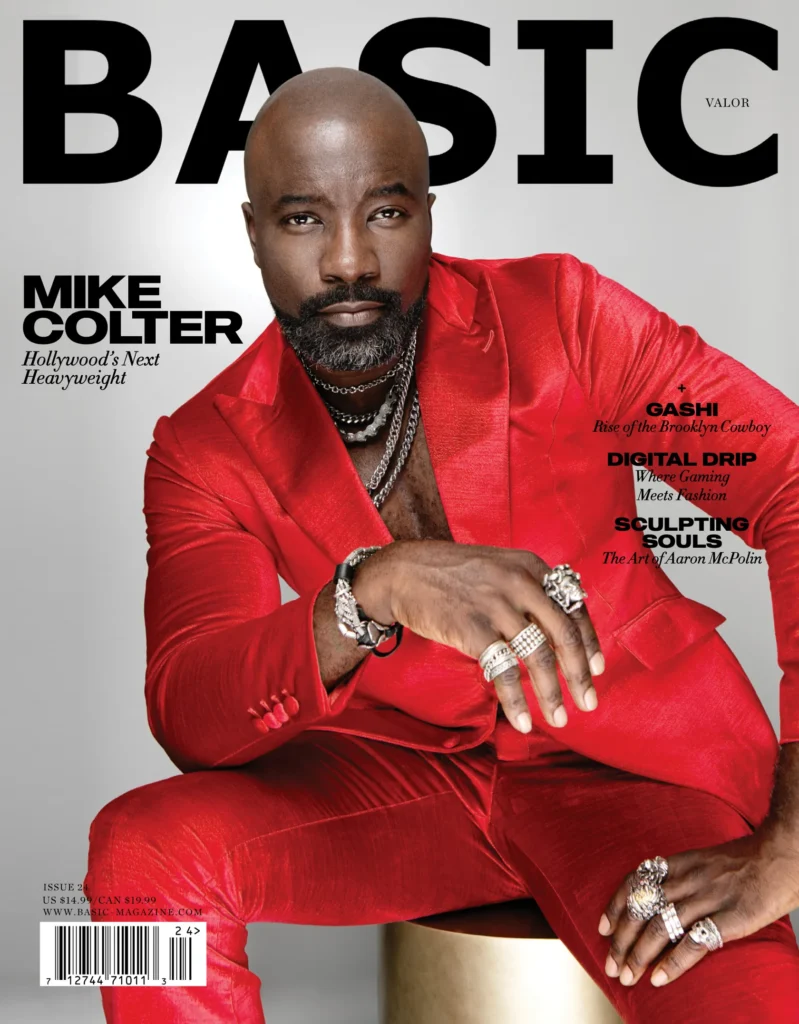PHOTOGRAPHER VIKTORIJA PASHUTA @viktorija_pashuta
MAKEUP KATHERINE MONCADA @beautybykathh

Rings, Earrings VINTAGE FUSION @vintagefusionjewelry
Words by Kimberly Haddad
Brandy Ledford, a seasoned actress and former model, boasts an illustrious career that spans an impressive three decades. Her exceptional talents have garnered multiple nominations for Best Actress, recognizing her remarkable performances in acclaimed films and television series. Although she has dazzled audiences with her roles in iconic projects such as Baywatch Hawaii, Modern Family, and Rat Race, Ledford’s true passion lies in her role as a devoted mother to her two sons and her unwavering faith.
As a woman who embraces sobriety, she has embarked on a transformative journey of self- discovery, redefining her sense of self-worth and rekindling a profound appreciation for life and self-love. In a society that often dictates unrealistic standards of success and worthiness for women, Ledford stands as a shining example of authenticity and refreshing resilience.
Can you briefly introduce yourself and provide some insight into your identity and background for those who may not know you?
I’m Brandy Ledford. I have been an actress for 33 years and I was a model before that. I’m known for my work in Baywatch Hawaii and Modern Family. I have a strong fanbase in the sci-fi community from my roles in popular shows such as Andromeda and Stargate, among others. My favorite character I’ve ever played was Doyle in Andromeda because she was allowed to be fully herself—smart, gorgeous, sexy, and strong. She was the most respected and powerful being in the universe, all while rocking a bubble gum pink jumpsuit! To me, this is the ultimate goal—the ability to be totally true to myself. Aside from my career, I am a sober wife and mother of two sons, a 28-year-old and an 11-year-old. They are the loves of my life. I’m a non-fundamentalist Christian, which means I believe in God/Jesus, but not most of the judgmental religious beliefs. I’ve lived in different countries and was raised in Redondo Beach. I love the beach, roller skating, swimming, dancing, yoga, music, sushi, fashion, books, and my dear girlfriends. They are my lifelines!
What does being your true self mean to you?
To me, being true to yourself means being able to embrace all parts of me—the good, the bad, and the ugly. I recently watched Inside Out 2 with my son. I was so moved by this movie and so grateful that my young son had this example of truly embracing all the messy and not-so-messy parts of our personalities. Joy, fear, anxiety, embarrassment, anger. I didn’t know it was okay to be vulnerable when I was a young girl. I spent a lot of time in shame, in isolation, afraid to express how I really felt about anything or what my real feelings were when it came to what I wanted or needed. Being true to myself would have helped me to set stronger boundaries with the people I needed to protect myself from, even just energetically. Being your true self means accepting ourselves for who we are and not being ashamed of our stories. It’s the ability to own our history and stories, our willingness to be fully vulnerable without fear of judgment, but more importantly, without judging ourselves. We are our own worst enemy. I am friends with a woman who will wear an evening dress to breakfast if it makes her happy. I’ve always admired her for that. She’s someone who is truly true to herself. But being true to yourself doesn’t mean not caring what other people think. That is a misconception. Of course we care what people think. We aren’t sociopaths! But it’s more about not letting my fear of what people might think about me guide my decisions. Thinking through outcomes based on what my values are and what matters to me, is one of the tenets of being true to myself.

Shoes MOLLY @brandedbymolly
Ring VINTAGE FUSION @vintagefusionjewelry
“But being true to yourself doesn’t mean not caring what other people think. That is a misconception. Of course we care what people think. We aren’t sociopaths! But it’s more about not letting my fear of what people might think about me guide my decisions.”
What experiences have shaped your understanding of authenticity and how do you cultivate a sense of true self-expression?
I am still learning this. I am by no means an expert on this, but as I get older, I’m realizing more and more that notbeing authentic is dangerous and damaging. When I was starring on Baywatch, I was asked to visit some middle school children in South Africa and speak to them about my experiences in life. I spoke very candidly about my drug use, alcoholism, suicide ideation, abortions, self-harm, etc. After my testimony, I opened it up for a Q&A. Each kid wanted to ask me something, but none of them wanted to ask their questions publicly. Instead, they lined up to speak with me in private. One by one, each kid practically told me the exact same story. They wanted to kill themselves or were practicing self-harm, they had been sexually and/or physically abused, they were in fear, they hated themselves and/or their parents, they were afraid to be themselves out of fear of judgment. I will never ever forget this experience. I told each of them that they were all going through similar feelings and if they would be willing to talk to each other about their issues, there would be so much healing in this shared supportive community. We are all so scared to share our true selves with each other, but we are each going through something. If we were all just honest about the things we are going through, we could heal together without judgment. From that day forward, I see people in a different way. We are each going through our own something. I don’t have to pretend to be someone else, unless I’m getting paid for it as an actress. The second I started being who I really was without self-judging, I found my tribe and my inner and outer circle of authentic friendships, but more importantly, I was able to rebuild my self-esteem and self-respect. I learned to like who I am and want to share who I am in a very real way—all parts of me, not just the polished.
Can you share with me a specific moment or experience that made you realize the need to address your substance abuse and start your journey towards sobriety?
My journey towards sobriety started for me when I was at my rock bottom. I have struggled with alcohol and drug use most of my life. I started smoking pot when I was 11, then started using cocaine and drinking alcohol when I was 14. I was in jail twice for alcohol-re- lated charges before I was 17 and became a full-blown cocaine addict by the time I was 18. I spent the next 25 years either drunk, high, or spending long periods of time “dry,” (not drinking or using drugs) but I wasn’t using a recovery program to help my addictive nature. I was addicted to other people, work, and had no real structure with my mental health. At one point, in 2012, things got so bad that I wanted to die. I didn’t see a way out. I was feeling hopeless and just wanted to end my life. I was sent to the hospital instead and went to rehab for 90 days where I learned about the disease of alcoholism and the 12 steps of recovery, which I still practice today.
What personal values or beliefs have grounded you in your sobriety journey, and how do they shape who you are today?
God is number one, leaning on a higher power instead of drugs, alcohol, work, or people. Sometimes, that can mean just sitting still and praying, or asking for help and knowing that there is always hope. I also have a dedicated morning routine that grounds me. I wake up and pray, read something spiritual or 12-step-based literature, and I meditate. I go to 12-step meetings, I mentor others, I have a mentor, I ask for help when I need it (this can sometimes be the hardest), I pause when agitated or doubtful and ask for the right thought or action. It’s also important to mention that I forgive myself when I’m not doing it right, which is often. I for- give others when they mess up. I am always willing to help others who ask for it and I show up as my authentic self always, even when I don’t want to, especially when I don’t want to.

Sunglasses LOEWE @loewe
In a society that often places value on external factors and validation, how did you find the courage to define your worth internally and avoid seeking it from unstable sources?
I often still seek validation from external factors and unstable sources. It’s hard not to sometimes. The intrigue and fantasy of it all can still get to me. But I don’t feel like my only value is external like looks, money, a house, etc. now. I used to only see my worth in other people’s views of me. I figured out pretty early on that it was easy to get doors opened for me, but I wanted what it took to stay in the room. That staying power became my goal and I knew it wasn’t going to happen on looks alone. I needed to have something to say. I started reading the newspapers and catching myself up on current events. This was back in the 90s when I was the Penthouse Pet of the Year. I asked for and got an entire set of Encyclopedia Brittanica, which I still have today. I read those books all the time. I wanted to be smart. I barely passed high school and never went to college. I went to drama school instead, but people who went to college knew how to be critical thinkers. I wanted a seat at the table and I wanted to be respected and admired. People idolize beauty. They may even say they respect it, but most of us didn’t do anything to be beautiful. I have great genes. I look like this because I was born looking like this. I didn’t do anything to achieve this, so how can my worth come from this? I love a compliment on my looks, but it’s fleeting. Tell me that I’m smart, that I’m kind, that I’m brave, that you liked what I said, that I moved or inspired you because I’m vulnerable, that I’m a great mom, an excellent friend. Those things matter to me. These are the building blocks to my self-worth, regardless of what others tell me.
How has your definition of beauty evolved over time, and how do you prioritize inner beauty and self-acceptance?
There is nothing more beautiful to me than someone being real and vulnerable. I don’t care what the person looks like. If they have substance on the inside, I want to get to know them. This is a shift for me. When I was younger, I was only interested in the shiny things. I can now look at artistry as a beautiful, raw emotion. Look at Chappell Roan. She turns me on so much because she’s so real and authentically herself. I find that beauty is about a feeling someone gives you when you feel their energy. I have been friends with the most beautiful women on earth, but to me, they aren’t very pretty if they aren’t deep. I want depth now. I want my beauty to be a beacon for others, not because of whatever lip gloss I’m wearing, but because you see this light inside of me that cannot be extinguished.
What advice would you give to others who may be struggling with their own identity and self-worth, or are at risk of turning to substances for validation or escape?
There is no amount of drugs or alcohol that will ever fill the void. Ever. There is no man, no woman, no job or money that will either. It’s gotta be an inside job.

You may also like
-
Staying Loud, Staying True: Spacey Jane’s Evolution from Perth to the World
-
Reframing Narratives with KATHERINE FLYNN
-
FIGHT TO THE OTHER SIDE: Hilary Roberts on Suffering, Freedom, and Sharing her Mafia Gifts
-
SEXY 4EVER – An Interview with INJI
-
BREAKING BREAD with GAVIN ROSSDALE: A Conversation about Music, Food, and the Art of Hospitality
-
UNCOVERED: The Liberation of MODEL ROZ